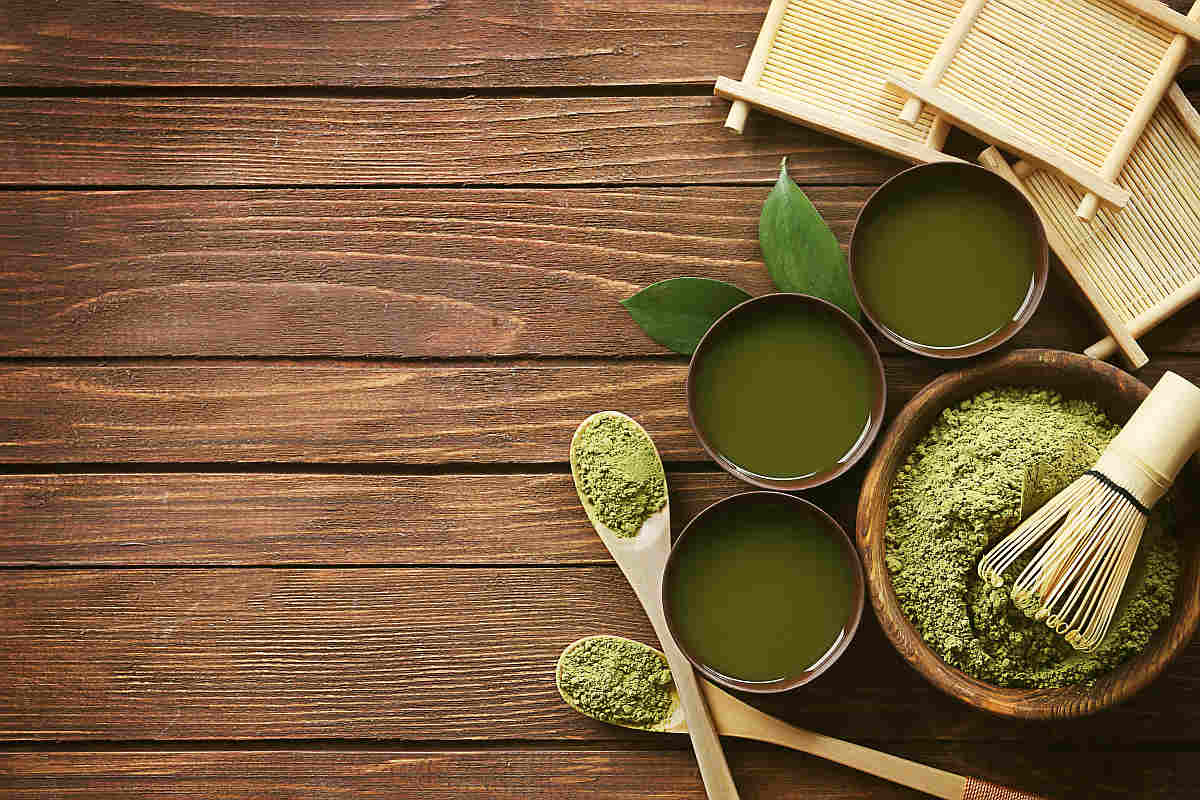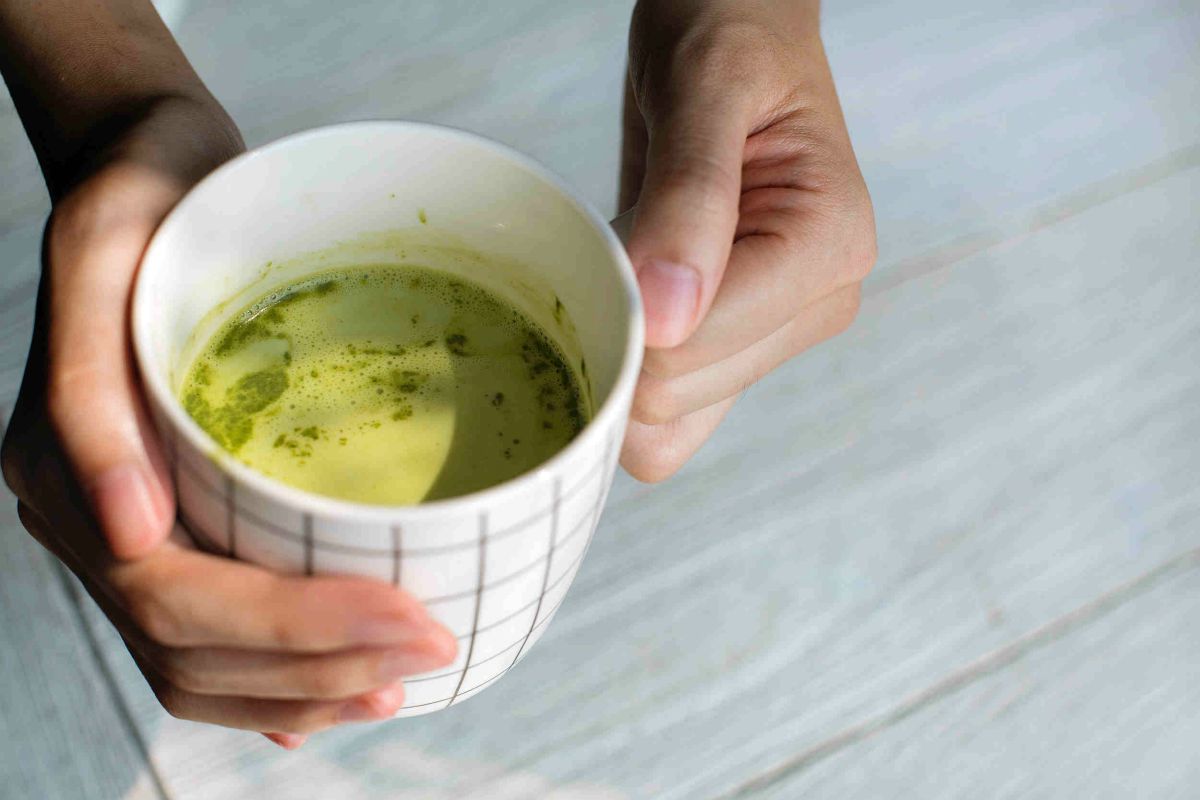Table of Contents[Hide][Show]
- What Is Matcha?
- How Matcha Tea Leaves Are Grown & Processed
- Moringa Tree: An Ancient Miracle
Moringa Health Benefits+−
- 1. Extensive Nutritional Content for Overall Health
- 2. Improvement of Well-Being Especially Controlling Blood Glucose
- Probiotic Tea: Everything You Need to Know
- 3. Fight Against Oxidative Stress to Prevent High Blood Pressure
- 4. Potential Water Purifier for Cleaner Water
- 5. Healthy Way to Lose Weight
- 9 Foods To Help Get Rid Of A Muffin Top
- 6. Reduction or Prevention of Chronic Inflammation
- Is Moringa Better Than Matcha?
Of all the super greens, why is there so much buzz around matcha and moringa tea? It’s not surprising at all.
Moringa and matcha are two sensational players front and center of today’s superfood stage. They may even come packaged with fantastic health claims and proud history lessons.
The discerning among us aren’t so easily convinced. What exactly are these two “healthy” foods, and why are they decidedly so good for us?
To know the answer, let’s take a look at moringa vs. matcha and what makes each so special. Learn which, if either, is better.
What Is Matcha?

Let’s begin the discussion with matcha. What is matcha?
Matcha is a powdered form of green tea. It is widely recognized as a Japanese export, but the practice of producing matcha originated centuries before in China.
Like all teas, strictly speaking, it’s made from the leaves of the tea plant called Camellia sinensis. The difference lies in the unique way it is grown and prepared.
How Matcha Tea Leaves Are Grown & Processed
While growing, tea bushes designated for matcha production are completely covered for up to three weeks. This stimulates the production of chlorophyll as the leaves adapt to lower levels of sunlight.
This, in turn, results in increased production of theanine, an amino acid that gives matcha its characteristic earthy flavor.
Where many teas are put through an oxidation process to develop particular flavors, matcha goes through the steaming process soon after harvest to prevent oxidation.
This helps preserve the natural colors, fragrances, and nutritional compounds. The leaves are then laid out to dry, de-veined, de-stemmed, and milled into the fine powder we find in stores.
Matcha Tea Benefits
The benefits of consuming green tea include a boost in these different areas, and studies back this information up, too.
1. Boosted Brain Cell Production Due to Its Antioxidant Properties
Brain cells do die, and the effects can be significant. These include limitations in spatial learning, memory loss, and cognitive impairment.
A 2012 Wiley study showed green tea might help maintain or boost the production of brain cells. One reason is epigallocatechin-3 gallate (EGCG), which has antioxidant properties.
Consumption of matcha tea, for example, may be a possible treatment for Alzheimer’s disease in the future.
2. Balanced Immune Function Through Increased T-Cell Creation

One of the potential matcha benefits is the regulation of immune function. An autoimmune disease occurs when the body’s immune system goes into overdrive, attacking the healthy organs.
To maintain balance or homeostasis, the body produces regulatory T-cells. The Oregon State University research suggested the polyphenol EGCG can increase the T-cell creation.
3. Blood Sugar Regulation Through Combination with Starchy Food
Controlling blood sugar levels or glucose is another of the many benefits of matcha tea. In this research, mice that took a combination of green tea and corn starch experienced a 50% reduction of glucose spikes than those that didn’t.
In human consumption, this translates to 1.5 cups of green tea. You should consume it with starchy foods or carbohydrates.
4. Cancer Cell Disruption Due to Reduced Risks
Pancreatic cancer is one of the deadliest types with a five-year survival rate of less than 10%, according to the American Cancer Society.
One of the reasons is the late diagnosis and the appearance of symptoms. New research, however, suggests green tea may help reduce the risk.
The 2014 study published in Metabolomics revealed EGCG in green tea might disrupt the activity of LDHA. It is an enzyme associated with this type of cancer.
Unlike with regular green tea, where we only consume a diluted infusion, you can ingest matcha as it is, whether in the form of tea, food, matcha powder, or dietary supplement capsules.
This makes matcha green tea powder a far richer bomb of nutrients. It contains chlorophyll, theanine, antioxidants, and vitamins (A, C, E and B complex). It also has minerals such as beta carotene and other micronutrients.
Moringa Tree: An Ancient Miracle

What is moringa? Moringa, specifically Moringa oleifera, is a type of tree native to the sub-Himalayan regions of East Asia. Its uses date back thousands of years in nutrition, traditional medicine, and cosmetic production.
It is fast growing and drought resistant. It can also thrive in a variety of climate conditions. This is why it’s called the “miracle tree.”
The moringa leaves are a candidate for food security. Since 2013, the moringa plant has been grown in Zambia.
It provides underdeveloped communities with a stable source of food and nutrition.
Moringa Health Benefits
There are many reasons to drink moringa tea. Here they are:
1. Extensive Nutritional Content for Overall Health
Drinking moringa oleifera tea is a toast to one’s health. Overall, moringa tea offers an impressive nutritional profile high in protein, fatty acids, vitamin A, vitamin B complex, vitamin C, and vitamin E.
It also contains potassium, calcium, and iron. You can find beta carotene, flavonoids, and polyphenols in it, too.
The nutrients are present in varying amounts. They are between the leaves, flowers, fruits, moringa seeds, and roots.
All parts of this plant are useful for humans. The roots have long been featured in Ayurvedic medicine.
The seed pods and flowers are consumed as vegetables. Moringa oil is used as far back as ancient Greece and Rome in the production of perfumes and ointments.
2. Improvement of Well-Being Especially Controlling Blood Glucose
Studies have identified moringa’s therapeutic potential across a range of ailments. It shows positive effects in the areas of lung function, digestive function, and immunology.
One of the health benefits of moringa tea is controlling blood glucose. It’s, therefore, good for those with diabetes.
It improves lactation (milk production after pregnancy), as well as in demonstrating a suppressive effect on certain cancers.
Related
Probiotic Tea: Everything You Need to Know
In this post, we’ll answer all your questions about probiotic tea, including what’s in it and how it can support both the digestive system and immune health.
3. Fight Against Oxidative Stress to Prevent High Blood Pressure

Many chronic diseases develop due to high levels of oxidative stress. This leads to the formation of free radicals in the body.
It can increase the chances of high blood pressure or hypertension, for example. While this is a medical condition, it is also a risk factor for heart disease.
A 2017 study revealed one of the benefits of moringa tea is it helps fight or decrease oxidative stress. It contains bioactive compounds such as quercetin, which have potent antioxidant activity. Moringa can also help prevent heart disease by helping to lower your cholesterol levels.
These components may also play a role in regulating liver enzymes. It then helps minimize the risks of non-alcoholic fatty liver disease.
4. Potential Water Purifier for Cleaner Water
Beyond food and health, the moringa seed has also been found to contain protein capable of water purification and material separation.
5. Healthy Way to Lose Weight
Some people claim one of the effects of moringa tea is weight loss. There’s not enough evidence to back this up, though.
In one small study, however, it may have helped decrease the weight alongside curry and turmeric. Within eight weeks, those who took a 900 mg supplement with these components lost an average of 10.6 pounds.
Related
9 Foods To Help Get Rid Of A Muffin Top
Do you want to know how to get rid of your muffin top? Start with these nine delicious and nutritious foods for a smaller waistline and a flatter belly!
6. Reduction or Prevention of Chronic Inflammation
The best analogy for chronic inflammation is a house on fire. It needs help, or else, it can lead to metabolic problems and development of diseases.
One of the moringa tea benefits is it has anti-inflammatory properties, with it being especially effective against a condition called colitis, which refers to the inflammation of the colon’s lining.
Today, moringa leaf teas and moringa leaf powder are growing in popularity as a dietary addition in Western health food stores.
Is Moringa Better Than Matcha?

According to moringa advocate and supplier Kuli Kuli, moringa beats matcha in the nutritional stakes. Not only does it contain all 9 essential amino acids, it also provides a far bigger nutrient output of fiber, protein, calcium, iron, vitamin A, vitamin C, and vitamin E.
In terms of efficiency, moringa tea also appears to triumph. It requires less investment to cultivate and prepare. It lends itself to a far wider range of uses than the prestigious powdered green tea.
The taste may be one arena where matcha holds the advantage. It has a refreshing umami bitterness that can be enjoyed by itself.
It can also add full-bodied flavor to a world of sweets and snacks. Next to the spinach-like qualities of moringa tea, it’s not hard to guess what your taste buds may prefer.
Science is still out on the therapeutic effects of either plant. Results of clinical trials do hint at interesting possibilities, but both superfoods still require further study before any health claims can be truly substantiated.
Either way, you can never go wrong with any of these super greens. Besides the above-mentioned matcha and moringa benefits, both of them are:
- Excellent sources of lutein, which promotes healthy eyesight
- Great in boosting your energy levels without the jitter
- Gluten-free, which makes them ideal for people with celiac disease
- Low in calories
- Plant compounds that encourage better nutrient absorption
Moringa vs. Matcha: How to Make the Most of the Super Greens
You also have many ways to boost their impact on your health. You can maximize their vitamins and minerals in the following ways:
1. Drink Them at Different Times of the Day
Do you know you can drink up to five cups of green tea a day?
These super greens are not only for breakfast, but they also complement your snacks, which can be fresh fruits or whole wheat bread with organic peanut butter.
2. Use an Antioxidant Blend
A high-quality antioxidant blend like Raw Nutritional alkaline greens is a green superfood powder that can provide even more health benefits when consumed with matcha or moringa. It is a combination of other healthy super greens as ingredients such as:
- spirulina (blue-green algae) and chlorella
- barley grass
- wheatgrass
- kale and spinach
- aloe vera
- and much more (contains more than 50 ingredients, from fruits, vegetables to roots and seeds)
With super greens powder, you can make them into a powerful juice packed with micronutrients. Just refer to the ideal servings per container, put it into a glass, and add cold water.
You can also make these greens powders into delicious and nutritious smoothies to further increase your vitality and energy. Combine the super greens with the fruits and vegetables of your choice.
Try Alkaline Greens today and save 20% with code WELL20.
Related
Seaweed: The Pros, Cons, And Ways To Add It To Your Diet
Is seaweed good for you? Learn about different seaweed health benefits as well as the potential challenges of consuming it.
3. Add Some Lemon
You can also be as traditional as you like with the super greens. With a green tea extract or a blend of super greens, you can pour hot water and add some lemon juice.
Adding lemon is an excellent way to improve the flavors of the greens, especially since they tend to be bitter. You can also enhance your vitamin intake as lemon contains a high amount of vitamin C.
4. Explore Food Ideas
It doesn’t matter which you choose when it comes to moringa vs. matcha. Both super greens are versatile enough so you can add them as ingredients to your favorite food.
Here are some ideas:
- Sauté your favorite vegetables in olive oil and then sprinkle some moringa tea leaves on top.
- Make a moringa or matcha ice cream or iced blend.
- Create a chia pudding with either matcha or moringa. Chia seeds are high in fiber, good fats, and omega-3 fatty acids.
- Combine matcha and dark chocolate to create date bars.
- Add berries and matcha to your granola bars.
- Make a moringa pesto. It boosts the flavor of typical proteins such as chicken.
- Create pasta out of moringa.
- Combine your favorite fruits and vegetables and turn them into summer salads.
- Improve turmeric recipes by adding moringa into soups.
- Use moringa powder to make a fruit smoothie.
- Make a matcha latte or moringa latte. Moringa is caffeine free but matcha already contains caffeine so no added espresso is required.
These food ideas not only improve the nutritional value of meals but also make it easier for you to feed your kids vegetables. They won’t even know they are already consuming super greens!
With the growing availability of both foods in the health food market, there’s little need to pick one green sensation over the other. You can enjoy both matcha and moringa separately or together in a range of beverages, desserts, and meals.
You May Also Like…
Editor’s Note: This post was originally published on February 26, 2016, and has been updated for quality and relevancy most recently on August 5, 2021.






